Celsius Caffeine Content: How Much Caffeine is in Celsius?
Whether you enjoy Celsius as a morning pick-me-up, a mid-day refresher, or a pre-workout option, it’s important to know how much caffeine is in Celsius drinks so you don’t overconsume caffeine or risk harming your health.
So, let’s cut right to the chase, here is how much caffeine is in a Celsius drink:
- 12oz Celsius cans contain 200mg of caffeine
- Celsius On-The-Go packets contain 200 mg of caffeine
- Celsius Essentials contains 270 mg of caffeine
For comparison, the amount of caffeine in Celsius drinks is on par with a large coffee or two espresso shots, delivering a substantial boost in energy.
The caffeine in Celsius energy drinks comes from natural ingredients like green tea extract and guarana seed extract, and I believe they are a quality choice for anyone needing long-lasting energy to power through the day.
However, it’s important to stay aware of your caffeine tolerance and how much you’re consuming daily.
If you’re looking to experience the energy boost of how much caffeine is in Celsius drinks, I recommend trying the Celsius On-the-Go Packets.
These powdered versions deliver the same 200 mg of caffeine per serving but come in a lightweight, travel-friendly format perfect for gym bags, travel days, or early mornings on the move.
You can find them at major retailers like Walmart or order them easily on Amazon, which is especially convenient if you use Amazon Prime or Walmart Plus, where you’ll often find multi-pack deals and fast shipping.
Disclaimer: I am an Amazon and Walmart affiliate, which means I may earn a small commission if you make a purchase through my links—at no extra cost to you. I only recommend products I personally use, trust, and believe provide real value to your health and performance.
Last update on 2026-01-15 / This article includes affiliate links/Images via Amazon Product Advertising API. I may earn commissions on purchases made through these links.
👉 For more fitness tips, nutrition advice, supplement breakdowns, and athlete-tested workout plans, be sure to follow me on YouTube, where I share frequent updates and insights as a professional athlete and wellness expert.
Want to learn more about how much caffeine is in a Celsius drink?
Read below, and find out all the details!
How Much Caffeine is in Different Celsius Drinks?
If you’re still wondering how much caffeine is in Celsius drinks, the answer depends on which drink you choose, but most Celsius options deliver a strong dose of 200 mg of caffeine per serving.
Whether you’re reaching for the original Celsius Live Fit can, a Celsius On-the-Go packet, or the more intense Celsius Essentials line, it’s important to know exactly how much caffeine you’re consuming.
This variety allows you to choose the best option for your needs, whether you’re prepping for a workout, getting through a long day, or just needing a quick energy boost.
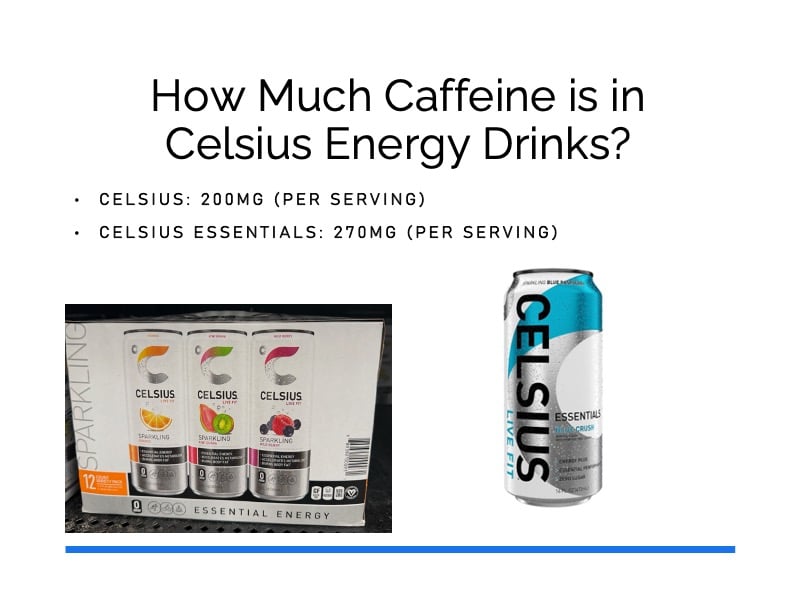
Each size of Celsius energy drink combines a blend of ingredients aimed at promoting energy and metabolism, but the caffeine content plays a key role in delivering that extra push.
I’ll explain more about daily caffeine limits below, but the FDA recommends a daily limit of 400 milligrams for most adults.
Based on how much caffeine is in a Celsius drink, one 12-oz can, or on-the-go packet of Celsius, accounts for half of that limit, and Celsius Essentials can provide almost 75% of the recommended maximum intake of caffeine per day.
Regardless of which type of Celsius drink you choose, monitoring your total caffeine consumption is crucial to avoid potential side effects like jitteriness, insomnia, or a racing heart.
| Celsius Product | Serving Size | Caffeine (mg) |
|---|---|---|
| Celsius On-The-Go | 1 packet | 200 mg |
| Celsius Essentials | 16 oz | 270 mg |
| Celsius Live Fit (Original) | 12 oz | 200 mg |
12oz Celsius Cans – 200mg of Caffeine
A standard 12-oz can of Celsius Live Fit contains 200 milligrams of caffeine, which is comparable to a large coffee or two espresso shots.
This makes it a powerful yet manageable energy drink for most healthy adults.
Like all types of Celsius drinks, he caffeine in the 12oz cans comes from natural sources like green tea extract and guarana seed extract, which provide smoother, more sustained energy than synthetic alternatives.
If you’re looking for a relatively healthy energy drink that supports focus, endurance, and fat burning without the crash, 12-oz Celsius Live Fit cans are a reliable option.
Last update on 2026-01-15 / This article includes affiliate links/Images via Amazon Product Advertising API. I may earn commissions on purchases made through these links.
16oz Celsius Essentials – 270mg of Caffeine
Celsius Essentials is the brand’s strongest option, delivering 270 milligrams of caffeine per 16-oz can.
That’s nearly 70% of the FDA’s recommended maximum daily caffeine intake in just one serving.
Designed for high-performance individuals, this version is best suited for athletes, weightlifters who need a strong boost, or anyone with a high caffeine tolerance looking to power through intense workouts or long, demanding days.
Due to its higher caffeine content, it’s generally not recommended to consume more than one can of Celsius Essentials per day, especially if you’re getting caffeine from other sources like coffee or pre-workouts.
Last update on 2026-01-15 / This article includes affiliate links/Images via Amazon Product Advertising API. I may earn commissions on purchases made through these links.
Celsius On-The-Go Packets – 200mg of Caffeine
Celsius On-The-Go packets offer the same 200 milligrams of natural caffeine as the Live Fit 12-oz cans but in a convenient powdered format.
The on-the-go packets are my favorite option, and in my opinion, these single-serve packets are perfect for travel, work, or keeping in your gym bag.
Simply mix a packet with water, and you’ll get the same energy-boosting benefits found in Celsius Live Fit, including increased thermogenesis, better mental clarity, and a boost in workout performance.
For individuals seeking portable, sugar-free energy with clean ingredients, these packets provide an excellent solution without sacrificing effectiveness.
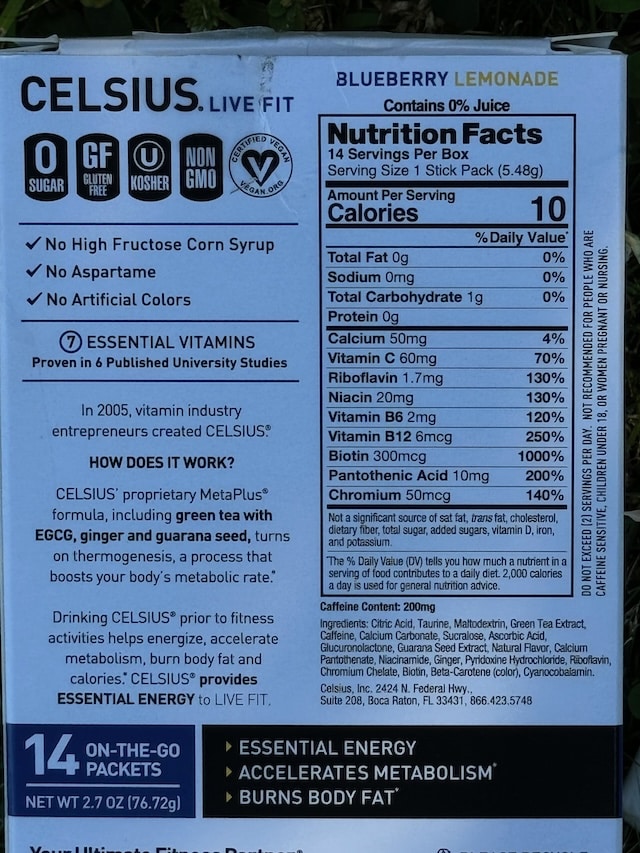
Last update on 2026-01-15 / This article includes affiliate links/Images via Amazon Product Advertising API. I may earn commissions on purchases made through these links.
Is the Caffeine in Celsius Natural or Synthetic?
Celsius uses natural caffeine from green tea and guarana. This natural source may provide longer-lasting energy with fewer crashes compared to synthetic caffeine found in many other energy drinks.
Is the Natural Caffeine in Celsius Drinks Different from Synthetic Caffeine?
Celsius sources its caffeine from green tea extract and guarana seed extract, both natural sources of caffeine.
Many other energy drinks rely on synthetic caffeine, which is lab-produced and often absorbed faster, leading to a sharper energy spike and potential crash.
Natural and synthetic caffeine are chemically identical, but the way your body responds to them can vary depending on the source and accompanying compounds.
In one example, a clinical trial showed that caffeine from green coffee bean extract and synthetic caffeine had nearly identical absorption rates and blood concentrations, confirming they deliver the same stimulant effect (Morton et al., 2018).
However, natural sources like green tea and guarana, used in Celsius, contain additional phytonutrients such as green tea extract (EGCG), which may support antioxidant activity, fat metabolism, and smoother energy release.
On the other hand, synthetic caffeine sources, such as those in drinks like Monster and Red Bull, may be harsher on the nervous system, leading to faster crashes, jitters, and headaches.
A separate study used carbon isotope analysis to show that natural and synthetic caffeine have distinct biochemical fingerprints, even identifying mislabeled drinks containing synthetic caffeine despite natural claims (Zhang et al., 2012).
These findings highlight subtle, yet meaningful differences between natural and synthetic caffeine sources, especially for consumers concerned about all areas of health.
Key benefits of natural caffeine in Celsius:
- Delivers CGAs and polyphenols for added metabolic support
- Less likely to cause jitters or a crash
For these reasons, Celsius is a better option for those looking for long-lasting, steady energy.
Is There Too Much Caffeine in Celsius Drinks?
The FDA recommends a daily caffeine limit of 400 milligrams for most adults, which is equivalent to two 12oz Celsius drinks.
When consumed within these limits, the caffeine in Celsius can provide various benefits, including improved physical performance, improved mental focus, and increased metabolism through thermogenesis (Evans et al., 2024).
This guideline helps mitigate potential side effects such as jitteriness, insomnia, and increased heart rate, which can occur when caffeine is consumed in excess.
While the general guideline is 400 milligrams, individual tolerance to caffeine can vary based on several factors, including age, body weight, genetics, and overall health.
For example, individuals with a higher sensitivity to caffeine may experience side effects at lower doses, while habitual caffeine consumers might tolerate slightly higher amounts without issue.
Based on how much caffeine is in one Celsius, here are some guidelines for healthy Celsius drink consumption:
- Since the original 12 oz Celsius drink contains 200 milligrams of caffeine, most adults can safely consume up to two cans per day as long as they aren’t getting caffeine from other sources.
- The 16oz Celsius Essentials packs a bit more caffeine, with 270 milligrams, so it’s generally recommended to limit yourself to one can per day to stay within safe limits.
Important: Remember that your total caffeine intake includes all sources, such as coffee, tea, energy drinks, or pre-workout supplements.
For instance, a cup of coffee can add 80-120 milligrams of caffeine.
Tracking your overall intake ensures you don’t exceed the recommended daily limit, which can help you avoid side effects like jitteriness, insomnia, or increased heart rate.
For most healthy adults, moderate consumption of caffeine in Celsius is safe and can be a helpful part of an active lifestyle.
However, individuals with conditions like heart arrhythmias or anxiety disorders should consult a healthcare provider before consuming high-caffeine products.
If you’re deciding between Celsius Original vs. Celsius Essentials, it’s important to consider their caffeine content and serving size to stay within safe daily limits.
Caffeine Sensitivity and Who Should Limit Celsius Intake
Some people are more sensitive to caffeine than others. Signs of caffeine sensitivity include:
- Jitteriness
- Increased heart rate
- Anxiety or nervousness
- Difficulty sleeping
If you’re caffeine-sensitive, consider:
- Starting with half a can to assess tolerance.
- Avoiding Celsius Essentials due to its higher caffeine content (270 mg).
- Switching to lower-caffeine alternatives like Bloom Energy (150 mg caffeine).
Celsius Caffeine Content Compared to Other Caffeinated Drinks
Although caffeine is the same molecule regardless of its source, how it’s delivered and what it’s packaged with can significantly affect how it feels in your body.
Unlike synthetic caffeine added in isolation to many sodas and energy drinks, the natural caffeine sources found in Celsius contain beneficial plant compounds that support metabolism, antioxidant activity, and a smoother energy curve.
These functional differences matter for anyone looking to optimize performance, reduce crashes, or support overall health through their caffeine intake.
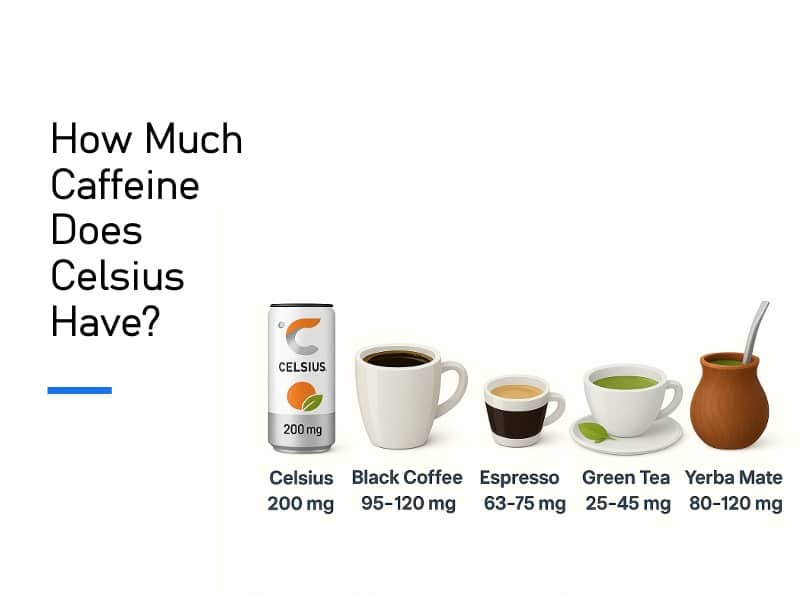
Celsius vs. Black Coffee
If you’re wondering how much caffeine is in a Celsius compared to a regular cup of black coffee, the difference is more than just a number, it’s about performance and purpose.
- Caffeine content: A 12-oz can of Celsius contains 200 mg, while black coffee varies but averages 95–120 mg per 8-oz cup.
- Other benefits: Both contain antioxidants, but Celsius includes thermogenic ingredients (guarana, green tea extract, ginger, B vitamins) designed to support fat-burning and energy metabolism.
- Verdict: Black coffee is simple and effective, but Celsius may offer more targeted benefits for workouts or sustained energy.
Celsius vs. Espresso
When comparing how much caffeine is in a Celsius to a shot of espresso, a primary difference comes down to intensity versus duration.
- Caffeine content: One espresso shot (1 oz) contains 63–75 mg of caffeine, so you’d need nearly 3 shots to match one 12-oz can of Celsius.
- Other benefits: Espresso provides antioxidants and is lower in volume, but Celsius offers adaptogenic and metabolic support through ingredients like ginger extract and taurine.
- Verdict: Espresso is strong and fast-acting; Celsius is better for a longer, cleaner energy lift without adding sugar or dairy.
Celsius vs. Green Tea
If you’re looking at how much caffeine is in Celsius compared to green tea, the gap is significant, but green tea offers powerful effects without too much caffeine.
- Caffeine content: Green tea averages 25–45 mg of caffeine per 8 oz, much lower than Celsius.
- Other benefits: Green tea contains high levels of EGCG, a potent antioxidant, and L-theanine, which promotes calm focus. Celsius uses green tea extract but omits L-theanine.
- Verdict: Green tea is ideal for stress reduction and light focus; Celsius is a more powerful energy booster with a thermogenic edge.
Celsius vs. Yerba Mate
To understand the effect of how much caffeine is in Celsius compared to yerba mate, you need to consider both the energy boost and the plant compounds in each drink.
- Caffeine content: Yerba mate averages 80–120 mg per 8 oz, depending on steeping strength.
- Other benefits: Yerba mate contains polyphenols, theobromine, and saponins, which are compounds that may aid digestion, immunity, and mental clarity. Celsius shares similar benefits via green tea and guarana but adds performance-supporting B vitamins and taurine.
- Verdict: Yerba mate is more traditional and earthy; Celsius is a modern, standardized option with consistent energy and improved workout support.
Celsius vs. Red Bull
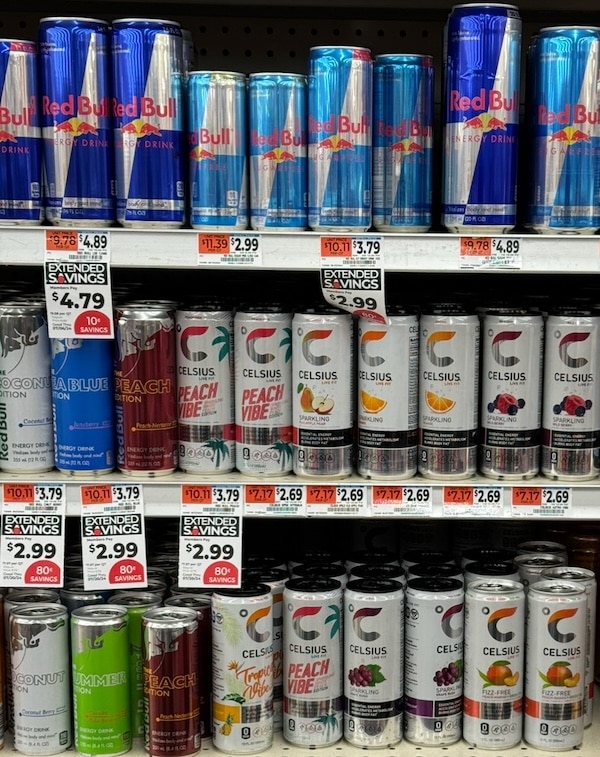
Celsius and Red Bull are two of the most well-known energy drinks, but they differ significantly in caffeine content, ingredients, and overall benefits.
- Caffeine Content: A 12 oz can of Celsius contains 200 mg of caffeine, while a standard 8.4 oz can of Red Bullonly has 80 mg. This makes Celsius over twice as strong as Red Bull in terms of caffeine per serving.
- Energy Source: Celsius derives its caffeine from natural sources like green tea and guarana, while Red Bull uses synthetic caffeine. Natural caffeine may provide a smoother, longer-lasting boost with fewer jitters.
- Sugar Content: Celsius contains 0g of sugar, whereas Red Bull has 27g per can, which can cause a sugar crash.
- Who It’s Best For: Celsius is better for individuals looking for clean energy and metabolic support, while Red Bull is more suited for casual energy drinkers who prefer a milder caffeine boost.
Winner: Celsius – If you compare Celsius vs Red Bull, Celsius energy drinks contain more caffeine, zero sugar, and natural energy sources, making it the better option for sustained energy. However, Red Bull is actually NSF Certified, which makes it slightly safer for athletes who are subject to drug testing and want to make sure they don’t consume any banned substances. But I do not believe Celsius will make you fail a drug test and is even endorsed by Olympic Sprinter Noah Lyles.
Celsius vs. Monster
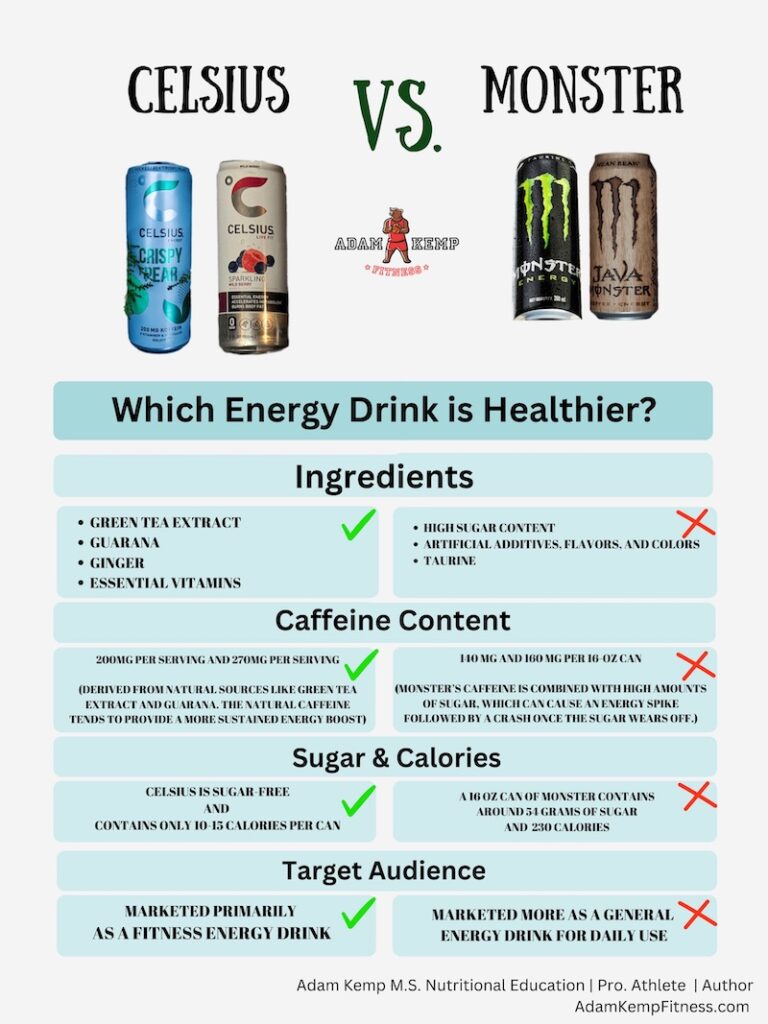
Monster Energy is a classic choice for those needing a big energy hit, but how does it compare to Celsius?
- Caffeine Content: A 16 oz can of Monster contains 160 mg of caffeine, while a 12 oz can of Celsius has 200 mg. Despite Monster’s larger serving size, Celsius actually has more caffeine per ounce.
- Ingredients & Energy Source: Monster contains synthetic caffeine, while Celsius provides a blend of natural caffeine from green tea and guarana.
- Sugar Content: An original Monster has 54g of sugar, leading to potential energy crashes. Celsius, on the other hand, contains zero sugar.
- Who It’s Best For: Monster appeals to gamers and those wanting a traditional, high-sugar energy drink, while Celsius is better for fitness-conscious individuals and those who want a clean energy source.
Winner: When comparing Celsius vs Monster, Celsius contains more caffeine per ounce, zero sugar, and natural energy sources, making it the superior choice.
Celsius vs. Alani Nu
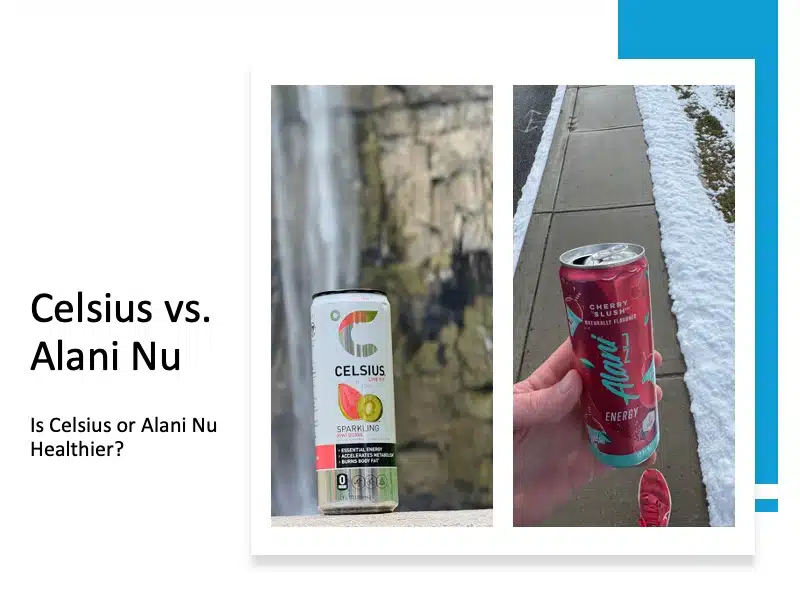
There are a few key differences when comparing Celsius vs Alani Nu Energy Drinks, but both target health-conscious consumers looking for zero sugar, high-energy drinks.
- Caffeine Content: Both drinks contain 200 mg of caffeine per 12 oz can, making them equally strong in terms of caffeine boost.
- Ingredients & Benefits: Alani Nu Energy Drinks includes L-theanine, which helps smooth out caffeine’s effects and reduce jitteriness, while Celsius contains green tea extract and guarana, known for their metabolism-boosting benefits.
- Sweeteners: While both drinks have zero sugar, Alani Nu uses sucralose, an artificial sweetener, whereas Celsius does not rely on artificial sweeteners, which some people prefer.
- Who It’s Best For: Celsius is a better choice for those focused on fitness and metabolism support, while Alani Nu is a great option for people who want a smoother energy boost with added focus-boosting ingredients.
Winner: Both are solid choices, but if you prefer natural metabolism-boosting ingredients, Celsius is better. If you want L-theanine for a calmer energy boost, Alani Nu is a great alternative.
Celsius vs. Ghost Energy
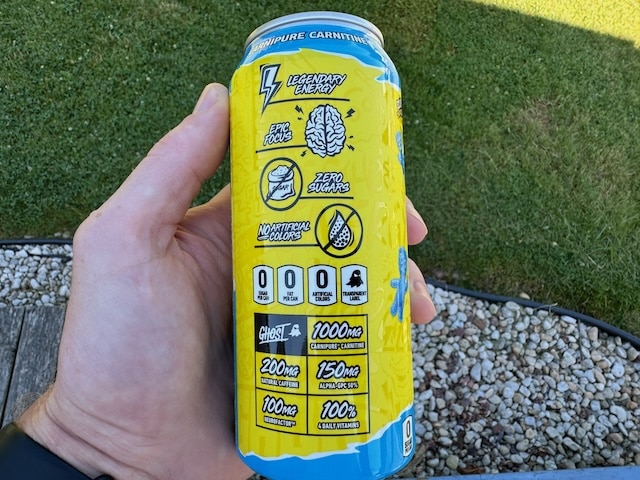
Ghost Energy Drinks and Celsius both cater to active individuals looking for a strong energy boost.
- Caffeine Content: Both Ghost and Celsius contain 200 mg of caffeine per can, providing an equal energy kick.
- Unique Ingredients: Ghost Energy contains alpha-GPC, a nootropic that supports mental focus, while Celsius includes green tea extract and guarana for thermogenic effects.
- Sweeteners & Additives: Ghost contains artificial flavors and sucralose, while Celsius avoids artificial sweeteners.
- Who It’s Best For: Ghost Energy is ideal for those looking for a sharper mental focus boost, while Celsius is better for those wanting long-lasting, clean energy with metabolism support.
Winner: Although Ghost provides a stronger energy kick, Celsius is healthier and does not contain any artificial ingredients, like Ghost energy drinks.
Celsius vs. Bloom Energy
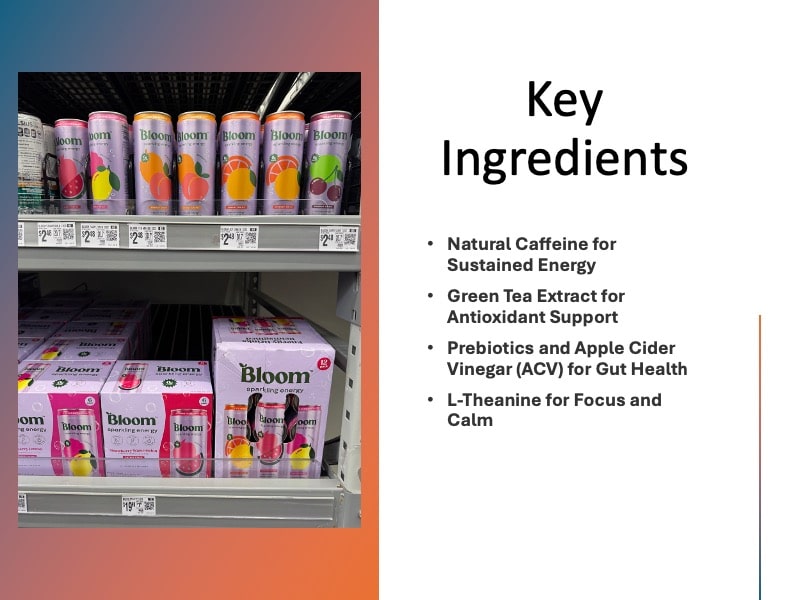
Bloom Energy Drinks and Celsius both focus on natural energy and clean ingredients, but their caffeine content and purpose differ.
- Caffeine Content: A 12 oz can of Bloom Energy contains 180 mg of caffeine, slightly less than Celsius’ 200 mg.
- Energy Source: Both use natural caffeine sources, but Celsius derives its caffeine from green tea and guarana, while Bloom gets its caffeine from green coffee bean extract.
- Health Benefits: Bloom contains green tea extract for antioxidants and metabolism support, similar to Celsius. However, Bloom also includes adaptogens, which may help reduce stress.
- Who It’s Best For: Celsius is ideal for those who want a stronger energy boost with a focus on metabolism and performance, while Bloom is a better fit for those seeking a slightly milder, more balanced energy drink with additional stress-reducing benefits.
Winner: Celsius’s slightly higher caffeine content and stronger thermogenic effects make it the better option for high-energy demands, but Bloom is one of the healthiest energy drinks and a great choice for those who prefer a balanced energy boost.
Final Thoughts: Celsius Caffeine Content Review
Knowing how much caffeine is in Celsius isn’t just about reading the label; it’s about understanding how that dose interacts with the rest of your lifestyle.
With 200 mg of naturally sourced caffeine in most varieties, Celsius delivers more than just stimulation; it offers a formula designed for clean energy, thermogenic support, and metabolic enhancement when used intentionally.
In my experience, the real edge comes from how the caffeine works in harmony with guarana, green tea extract, and B vitamins, which is a main reason why Celsius drinks burn fat, accelerate metabolism, and provide an additional energy boost compared to other options.
This synergy creates a more functional energy profile, which is ideal for athletes, busy professionals, or anyone looking to avoid the crash that often follows synthetic energy drinks.
To get the most from Celsius, treat it like a performance tool, not a daily habit to rely on mindlessly.
- Pair it with hydration and nutrient-dense meals
- Avoid stacking it with other high-caffeine supplements
- Use it strategically, like before workouts or demanding tasks
Whether you’re using the cans or the On-The-Go packets, Celsius can be a valuable part of your daily routine, as long as you stay aware of your overall caffeine intake and use it with purpose.
Last update on 2026-01-15 / This article includes affiliate links/Images via Amazon Product Advertising API. I may earn commissions on purchases made through these links.
For more information, check out my YouTube video that covers the pros and cons of CELSIUS Energy Drinks:
Frequently Asked Questions About the Caffeine in Celsius Drinks
This section covers frequently asked questions about Celsius caffeine content, including how it compares to recommended daily limits, who should monitor their intake, and how to balance Celsius with other caffeine sources.
If you’re wondering how much Celsius is safe to drink or whether it fits into your lifestyle, here’s everything you need to know.
Read Next: Are Celsius Drinks Bad for You?
This website does not provide medical advice. This website site does contain affiliate links, and purchases may earn a commission.
Read my Medical Disclaimer, Review Disclaimer, and Publishing Policies for more details. Use of this site indicates acceptance of these terms.






